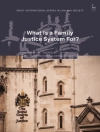This book brings together leading legal theorists to present original philosophical work on the concept of law – the central question of jurisprudence. It covers five broad topics: firstly it addresses debates concerning the methodology of jurisprudence. In Part II it focuses on the notion of a legal system and its coercive nature, while Part III explores the relationships between law and morality, the traditional point of contention between positivist and non-positivist theories of law. Part IV then examines questions regarding law’s normative character and relationships with practical reason. Lastly, the final part introduces two novel theoretical approaches to conceptual jurisprudence.
Table des matières
Introduction: The Questions of Conceptual Jurisprudence.- Part I. Methodological Questions.- On the Concept of the Concept of Law.- Re-evaluating the Value Neutral Approach.- TBD.- TBD.- Part II. The Legal System as a Conceptual Tool.- A Positivist Formulation of the Legal System.- The Concept of Legal System Revisited.- The Good, The Bad and the Puzzled: Coercion and Compliance.- TBD.- Part III. Law, Morality, and Normativity.- Hard Cases and Legal Validity: Hart’s Insights on the Internal Normativity of Law.- Is Hart’s Theory a form of Inclusive Legal Positivism?.- Between Authority and Interpretation.- The positivist account of lawyer’s role: legal ethics and the concept of law.- Law, Coordination Problems and Economy.- Part IV. New Theoretical Approaches to Conceptual Jurisprudence.- Law as an Expression of Adopted Justice.- A Dilemma for Shapiro and Plunkett.- Law’s Virtual Empire: The Law-Game Analogy in the 21st Century.- Complex Legal Constructivism.












